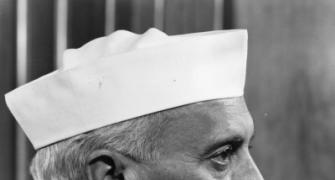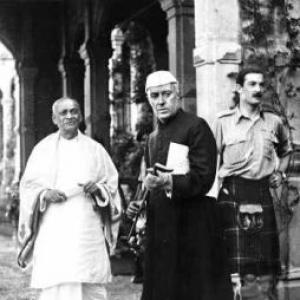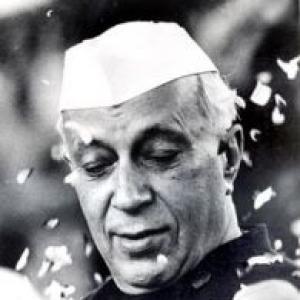 While Nehru remains an icon for many, including his critics, for the stellar role he played in building institutions of democracy, the 1962 humiliation blots Nehru's copybook, says Colonel Anil A Athale (retd).
While Nehru remains an icon for many, including his critics, for the stellar role he played in building institutions of democracy, the 1962 humiliation blots Nehru's copybook, says Colonel Anil A Athale (retd).
Fifty years ago on May 27 Jawaharlal Nehru, our first prime minister, passed on and for a generation like this author's, an era ended. There was seldom an eye in the country that had no tears on that day. For the post 1947 generation he was the beloved 'Chacha Nehru'.
For this generation, (now virtually taking over the country, Narendra Modi belongs to this generation) Nehru's death is also linked to another traumatic event: The Sino-Indian conflict of 1962. Many joined the armed forces in the upsurge of patriotism in the wake of the Chinese aggression.
While Nehru remains an icon for many, including his critics, for the stellar role he played in building institutions of democracy, the 1962 humiliation of India at the hands of the Chinese blots Nehru's copybook.
This article is intended to make an honest appraisal of Nehru's defence policy and failures in that area. Fifty years is a long time and does lend certain objectivity to the exercise.
Unfortunately for Nehru, all these years there was an unannounced censorship on Nehru's criticism. This author had collected documents from the Kennedy archives in 2003 and tried to write an account of the 1962 fiasco based on the evidence. But to one's dismay it was impossible to get any space in the media. The shoe now is on the other foot.
With a change of government and general disgust with the doings of the 'dynasty', Nehru's heritage is influenced by the dark shadows of his progeny's misdoings. The author wishes to state, right up front that he intends to be neither a Nehru bhakta (devotee) nor a Nehru basher. One of India's most illustrious sons deserves better.
There are two aspects to criticism of Nehru on the whole gamut of Sino-Indian relations. His critics charge that Nehru was 'naive' and did not understand the Chinese intent and designs. The second criticism of his policies is that he neglected defence.
Let us take the first one, that Nehru was naive vis-a-vis the Chinese. From all available evidence, it seems Nehru was well aware of China's great power ambitions and their intent to pressure India on the India-Tibet border. He, however, calculated that given the 'implicit' American support to India, in case of an overt Chinese threat, he felt that they will dare not use military force.
The Americans at that time were engaged with Communist China on Taiwan (with the crisis over shelling of Quemoy-Matsu islands) would have welcomed an opportunity to open second front against the Chinese. Strategic analysts like Thomas Schilling have commented that Nehru understood this very well and was therefore disdainful of Pakistan that went on a treaty signing spree with the US, thinking that US power could be brought in to countervail India.
Nehru apparently got an assurance to this effect during his US visit in 1960. With India's warm relations with the erstwhile USSR, he felt confident that 'Chinese will never attack'. This was indeed the theme song of the political leadership whenever the army raised alarm over Chinese intentions.
Unfortunately for Nehru, the Chinese, who possibly had prior knowledge about the placement of Russian missiles in Cuba, took full advantage of the fact that during October 1962, the attention of both the superpowers was fully focussed on a far graver crisis of Cuba. Neither had any time for the conflict in the remote Himalayas. President John F Kennedy virtually 'outsourced' the US response to their capable Ambassador John Kenneth Galbriath.
In a conversation with late Professor Galbriath in May 2003, he confirmed as much. If one carefully looks at the time line of major events of the 1962 conflict, one realises that every single event was linked to the developments in the Cuban missile crisis. The attack coincided with the naval blockade, made effective on October 20, 1962. Literally to the day, the Chinese announced a unilateral cease fire on November 21 just as the US and USSR reached an agreement to resolve the missile crisis.
This author's observation were corroborated by Ashok Parthasarthy, recalling the briefing Nehru gave to Ambassador G Parthasarthy (his father) before going to China saying that he does not trust the Chinese. Essentially Nehru was done in by the circumstances (the Cuban Missile Crisis) beyond his control.
The image of a saintly and naive Nehru being stabbed in the back was partially Nehru's own creation. The classic example of this is seen in the Chetan Anand's movie, Haqeeqat (the filming of which Nehru gave full government support as told to this author by Chetan Anand himself in 1988). This was his way of deflecting criticism of his handling of the situation.
Nehru, however, cannot be absolved of the charge of the neglect of and ignorance of the military dimension of foreign policy. He brilliantly used the strategy of non-alignment to advance the national interest of peace and ability to focus on economic development, the national goal in a desperately poor country like India. He calculated that given time, the industrialisation initiated by him (including the fiercely independent nuclear programme), would automatically give India the necessary defence capability.
His foreign policy was thus not backed by military force. His failure lay in ensuring the 'minimum' credible military deterrent against likely adversaries.
While India maintained the fiction of 'non-alignment' post 1962, the fact remains that vis-a-vis the Chinese, we began to toe the American line. This was evidenced by our 'silent' support to America in that devastating Vietnam War. His disdain for military and lack of knowledge about military affairs came out starkly on November 20, 1962. Advised by his crony general, in his letter to President Kennedy asking for direct American military intervention, he said, 'Huge Chinese armies are marching into Assam!'
The truth is that only a patrol of 10 had reached the Chako post on the Assam foothills, still a good 100 km away from the Brahmaputra valley. It was a panic reaction born out of ignorance. His neglect of the needs of soldiers fighting in the extreme cold of the Himalayas meant that over 2,500 men lost their limbs to the cold, much more that any action by the Chinese. It also meant that the Indian soldiers faced Chinese soldiers armed with automatic rifles while we had to make do with the Lee Enfield bolt action 303 rifle of 1941 vintage, the same rifle with our policemen after 100 years while the terrorists have the AK-56s.
While much water has flowed down the Brahmaputra and Namka Chu (the river banks on which the Chinese decimated 7 Brigade under Brigadier John Dalvi in 1962). The situation is indeed much better on the border or in defence preparedness.
In this 50th year of Nehru's passing we ought to take two lessons to heart -- 'minimum credible military deterrence' needs constant and professional re-evaluation. As to the military knowledge of political leaders when they have to press the button (of nuclear retaliation), we must make organisational changes so that the PM has at all times a military expert in his personal staff to help him decide and not take panic decision like Nehru did on that fateful November 20, 1962.
This will be fitting tribute to a great son of India.








